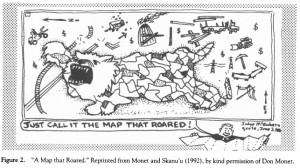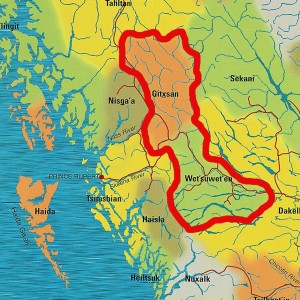Judge McEachern’s comment “We’ll call it the map that roared”
Question # 3: In order to address this question you will need to refer to Sparke’s article, “A Map that Roared and an Original Atlas: Canada, Cartography, and the Narration of Nation.” You can easily find this article online. Read the section titled: “Contrapuntal Cartographies” (468 – 470). Write a blog that explains Sparke’s analysis of what Judge McEachern might have meant by this statement: “We’ll call this the map that roared.”
What Judge McEachern potentially meant by the former statement, could have been the allusion towards being demeaning to the cartographic efforts by the Wet’suwet’en and the Gitxsan. Sparke mentions in his analysis that McEachern’s comment may have been a reference to Peter Sellers’s 1959 film, “The Mouse That Roared”…which is a clever association by Sparke, and an observation of potential truth to the words that McEachern shared in the Delgamuukw v. the Queen trials. Perhaps Judge McEachern’s words were simply a Freudian slip, a mere mixture of words in an attempt to make a joke in court, about his opinion of the maps which clearly outlined the Wet’suwet’en and Gitxsan historical territory. Perhaps the cartographic maps did not supply enough “accroutrements of Canadian colonialism on Native land” (Sparke, 468), and were not convincing enough maps to prove historical presence. Or, perhaps, McEachern did really intentionally mean to refer to the maps as “the map that roared” (468). A pretty crude comment if I do say so myself, that is, if the association that McEachern made from the map to the film was true.
For those of you who have not read of the novel (by Leonard Wibberley) , or seen the film, “The Mouse that roared”, it is pretty much a satirical novel-turned-film that takes place during the cold war, when an attack in New York city is declared and brought upon by a small, impoverished, fictional country in Europe. Amazon describe the film as being “…a poignant tale of political morality, and a hilarious, ultimately triumphant portrait of international relations from the perspective of the little guy”. The main goal of the fictional country was to lose the war, so they could receive American foreign aid to replenish their country’s impoverished state.

Looks like a film, full of satire! Funny film, worth the watch.
The film sounds all too satirical, and lines-up with so many commonalities in Canadian politics. Interestingly enough, couldn’t we say that the film is a metaphor for the Delgamuukw trials? Maybe Judge McEachern would think so. I mean, think about it, we got the “little guy” (the Gitxkan and the Wet’suwet’en), who is impoverished and declares war on the big guy (Canadian Government), who’s goal is to receive financial victory from their superiors (Aboriginal Title and land declaration). Perhaps I am making subjective associations as I see them, but the plots in the Delgamuukw trials, and “The Mouse That Roared”, possess so many similarities. I think McEachern might have been onto something here. Words mean many things, and in his brief statement, it seems all too obvious to not say that he wasn’t referring the maps to the film.
I find “the map that roared”, to be quite insulting, actually. Why? Well, if we can associate McEachern’s comment about the maps to the film, the “little guy”, who is represented by the Gitxkan and the Wet’suwet’en, are seen as people with unrealistic ideals and are portrayed as being foolish. That being said, the cartographic maps are representations of the Gitxkan and the Wet’suwet’en people. In court, McEachern betrayed recognition of the Gitxkan and the Wet’suwet’en’s efforts to demonstrate their historical presence on their traditional land, and dismissed them with “colonialist claims about the extinguishment of aboriginal rights” (470). Jeez! Way to push aside some cool evidence and hard work with outdated, discriminating, colonialist notions. The Gitxkan and the Wet’suwet’en created these maps in “attempts to outline their sovereignty in a way Canadian court might understand” (468). Perhaps McEachern did not understand, and called them foolish and unrealistic by referencing their hard work to the satires of “The Mouse that Roared”.
Overall, I believe McEachern was being unrealistic with the Gitxkan and the Wet’suwet’en Nations, and did not give them a chance to prove their Aboriginal Title and sovereignty. Doesn’t matter what McEachern’s meant by his comment anyways because The Supreme court ended up overturning his judgement, and gave possibility for more trials to the Gitxkan and the Wet’suwet’en, to prove sovereignty over their land. Ha, how ironic. I wonder what McEachern’s would say if anyone called him the Grinch That Stole Christmas?
Works Cited
1) Amazon. The Mouse That Roared: A Novel. Leonard Wibberley. Beach Reads. 10 Jan 2003. Web. 20 June 2015. <http://www.amazon.ca/The-Mouse-That-Roared-Novel/dp/1568582498>
2) First Nations Studies Program. Bill C-31. Indigenous Foundations. UBC. 2009. Web. 20 June 2015. http://indigenousfoundations.arts.ubc.ca/home/government-policy/the-indian-act/bill-c-31.html
3) Sparke, Mathew. “A Map that Roared and an Original Atlas: Canada, Cartography, and the Narration of Nation.” Annals of the Association of American Geographers 88.3 (1998): 463- 495. Web. 20 June 2015.) <http://www.uky.edu/~tmute2/geography_methods/readingPDFs/sparke-narration.pdf>

